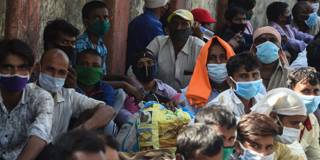By sharply curtailing international trade, the COVID-19 pandemic has accelerated a trend that was already underway. It is now more important than ever for developing countries to seek alternatives to export-led growth.
NEW HAVEN – The COVID-19 pandemic seems to have curtailed globalization in ways that the current US administration could scarcely have dreamed up even a year ago. But, viewed in a broader context, this year’s retreat from globalization is merely the latest chapter in an ongoing process that has left the developing world increasingly pessimistic about pursuing export-driven growth as a path out of poverty.

NEW HAVEN – The COVID-19 pandemic seems to have curtailed globalization in ways that the current US administration could scarcely have dreamed up even a year ago. But, viewed in a broader context, this year’s retreat from globalization is merely the latest chapter in an ongoing process that has left the developing world increasingly pessimistic about pursuing export-driven growth as a path out of poverty.